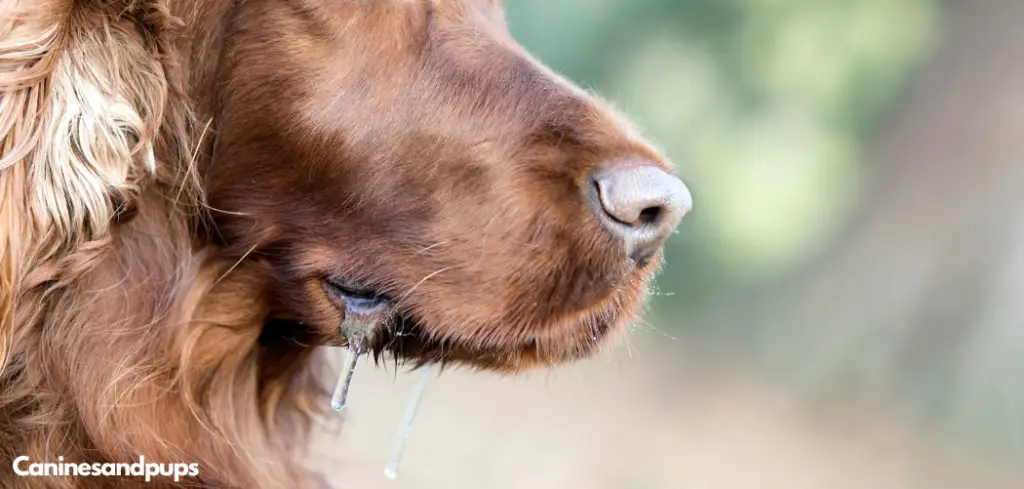When a dog suddenly starts drooling excessively for no reason, it can be alarming and confusing for owners. While some drool is normal, a sudden change in saliva production may point to an underlying health issue that needs attention.
We outline the common reasons for a dog drooling excessively for no reason, what you can do at home, and when to seek veterinary help.
Dog Excessive Drooling for No Reason — Why It Happens
Excessive drooling in dogs can occur for many reasons, ranging from mild irritations to serious medical conditions. Dogs may drool because of nausea, dental issues, heatstroke, or even a foreign object stuck in the mouth. Certain toxins, organ diseases, or anxiety can also trigger uncontrolled salivation.
While some causes are harmless and temporary, others may require immediate veterinary treatment to protect your dog’s health.

Dog Excessive Drooling for No Reason: Common Causes
Dental Disease
Dental problems are one of the most common reasons dogs drool excessively. Gum infections, tooth decay, or painful abscesses make it uncomfortable for a dog to keep saliva in their mouth.
Owners may notice bad breath, difficulty chewing, or pawing at the face along with drooling.
If left untreated, dental disease can spread bacteria throughout the body, affecting the heart, liver, and kidneys. Regular dental care is key to preventing this cause of drooling.
Read more: Why is my dog excessively drooling and shaking? (Here’s why)
Nausea and Gastrointestinal Upset
When a dog feels nauseous, drooling is often one of the first symptoms. Motion sickness during car rides, stomach upset from eating something unusual, or more serious digestive problems like pancreatitis can all trigger salivation.
Owners may also notice lip licking, restlessness, or vomiting following the drooling. Persistent nausea should never be ignored, as it may signal an underlying illness needing veterinary care.
Foreign Object in the Mouth or Throat
A bone shard, stick, or piece of a toy stuck in the mouth or throat can lead to sudden and excessive drooling. Dogs may paw at their mouth, gag, or refuse to eat.
This situation can quickly become dangerous if the object blocks the airway or causes injury. Veterinary removal is often required, especially if the object is sharp or lodged deeply.
Heatstroke
Overheating is another serious cause of sudden drooling. When a dog is exposed to hot temperatures or exercised too much in warm weather, excessive panting and drooling may occur as the body tries to cool down.
Other symptoms include weakness, rapid heartbeat, red gums, and in severe cases, collapse. Heatstroke is life-threatening and requires immediate veterinary attention.
Poisoning or Toxin Exposure
Certain plants, household chemicals, and even human foods like chocolate or xylitol can cause toxic reactions in dogs.
One of the early warning signs of poisoning is heavy drooling, often accompanied by vomiting, tremors, or seizures.
If poisoning is suspected, seeking urgent veterinary help is critical. Quick treatment can save a dog’s life.
Anxiety or Stress
Some dogs drool excessively when stressed or anxious. Triggers like thunderstorms, fireworks, or car rides can lead to heavy salivation. Unlike medical causes, stress-related drooling often resolves once the dog feels safe and calm again.
However, chronic anxiety may need to be addressed with behavioral support, training, or in some cases, medication prescribed by a vet.
What to Do If Your Dog Is Drooling Excessively for No Reason
If your dog suddenly begins drooling, first observe carefully for other symptoms. Look at their gums, check their mouth for visible injuries or objects, and monitor for signs of nausea or distress.
Encourage your dog to rest in a cool, quiet space. Offer fresh water and watch whether they are willing to drink and eat normally.
If drooling is mild and short-lived, it may pass on its own, especially if related to excitement or temporary stomach upset.
Avoid giving human medications or home remedies without veterinary advice. These can make the problem worse.
Keep a note of when the drooling started, how long it lasts, and any other changes in behavior. This information is valuable if you need to visit your vet.
When to Call or Visit Your Vet
If drooling is persistent, severe, or accompanied by other concerning symptoms, veterinary attention is necessary.
Call your vet immediately if your dog also shows signs of vomiting, lethargy, difficulty breathing, pawing at the mouth, or signs of pain. These may indicate a foreign object, poisoning, or another serious issue.
Drooling with red or pale gums, refusal to eat or drink, or collapse is an emergency. Go to the vet or emergency clinic right away.
Even if drooling seems mild, schedule a vet check if it continues for more than a day or happens repeatedly. Chronic drooling is often linked to dental disease or other conditions that need treatment.
Read more: Dog drooling not eating or drinking (Should you worry?)
Key Takeaway
Excessive drooling in dogs for no apparent reason can be unsettling, but it’s always worth investigating. While some causes are harmless, others can be life-threatening if ignored.
Pay attention to changes in your dog’s behavior, monitor for additional symptoms, and never hesitate to reach out to your veterinarian if you’re concerned.
With prompt care and attention, most causes of sudden drooling can be managed effectively, helping your dog feel comfortable and safe again.
